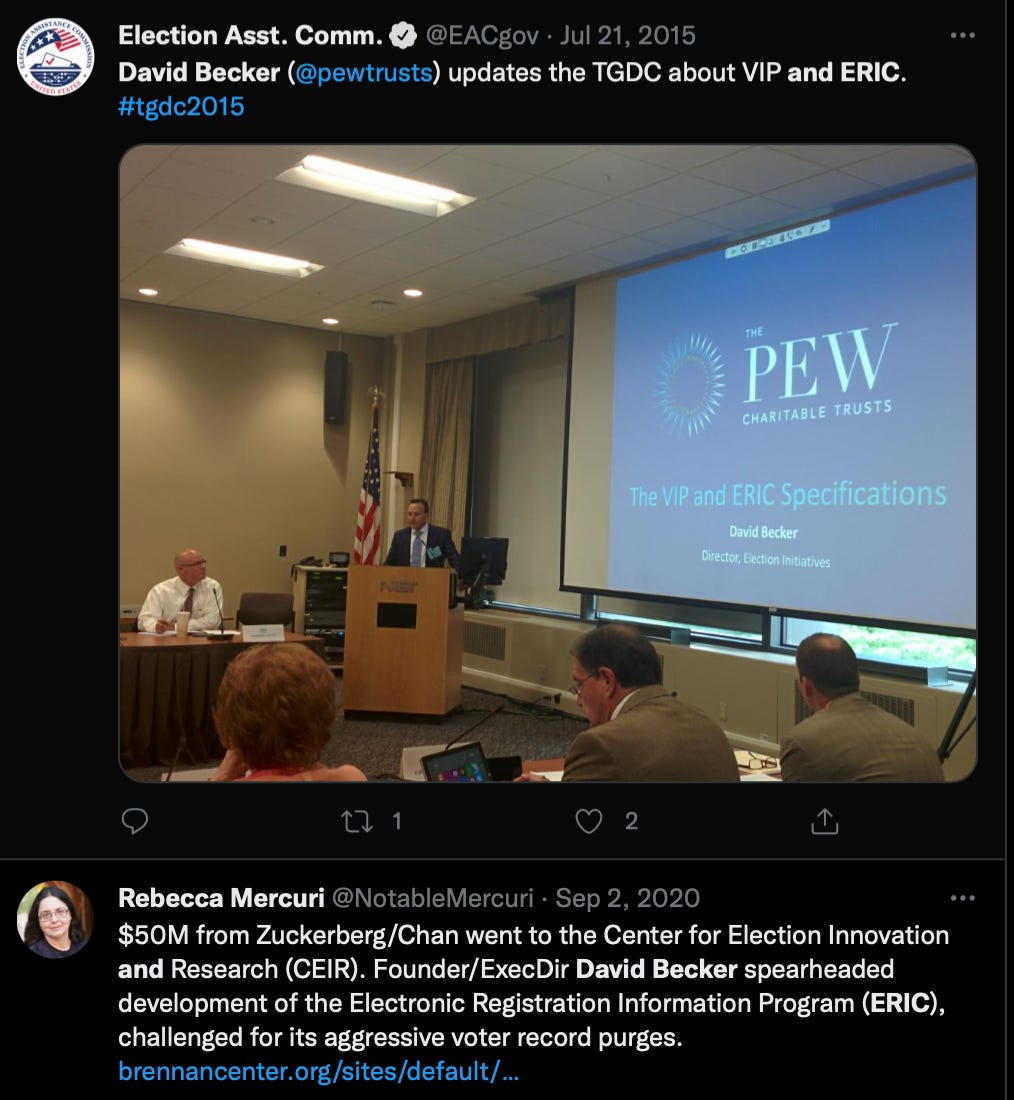Who Is ERIC And Is The Fox Guarding The (Voting) Hen House?
The first of four articles looking at the non-profit organization assisting states in improving the accuracy of America's voter rolls...
The Electronic Registration Information Center (ERIC) is a non-profit organization that states its sole mission is to assist states to improve the accuracy of America’s voter rolls and increase access to voter registration for all eligible citizens. In 2020, thirty states and the District of Columbia (D.C.) were members of ERIC. But, can ERIC be trusted? Let’s take a closer look.
ERIC is paid by its members to provide two services: 1) to keep their voter registration rolls accurate and up-to-date, and 2) to increase access to voter registration for ALL eligible citizens. ERIC charges a $25,000 one-time joining fee and then members pay annual dues based on a formula that includes the voting age population as a factor.
For the first service, each member state must submit their state’s voter registration data, motor vehicle licensing data, and social security information to ERIC at least every 60 days. ERIC’s technical staff compares that data against data from all the other member states and Social Security death data - known as the Limited Access Death Master File. ERIC uses sophisticated data matching software to create reports that identify voters who have moved within the state, voters who have moved from one ERIC-serviced state to another, voters who have died, voters with duplicate registrations in the same state, and deceased voters. ERIC also generates a National Change of Address (NCOA) report, using official data from the U.S. Postal Service (USPS).
With the second service, ERIC provides a list of ‘Eligible but Unregistered’ (EBU) constituents in the member states, to help with their get-out-the-vote (GOTV) operations. ERIC, using information from the state’s voter registration rolls, Departments of Motor Vehicles (DMV), and the USPS, generates a list with information on eligible but unregistered constituents for all member states. The ERIC-generated mailing list is then used to contact unregistered people to get them to register to vote.
So, what’s my concern with ERIC? ERIC was formed in 2012 with assistance from The Pew Charitable Trusts, with David Becker as co-founder. David Becker is currently a non-voting ERIC Board Member. My concern is that both The Pew Charitable Trusts and David Becker hold left-leaning, liberal political ideologies. Let’s take a closer look at both.
According to the Capital Research Center, The Pew Charitable Trusts has become a left-wing organization that has abandoned its original values. Conservative grantmaking for conservative charities has become a thing of the past for the Pew Charitable Trusts; environmental, biomedical, and economic research, funding for the arts, and policy research are now their main concern. They have taken such a 180-degree turn that they have funded environmentalist groups who oppose oil drilling in Canada, the very product that gave them the generous funding they have today.
Who is David Becker? David Becker is a left-leaning election law advocate, who worked at Pew Charitable Trusts and helped organize the creation of ERIC. Before this, Becker was the director of People for the American Way and worked in the U.S. Department of Justice as a litigator. David Becker is currently CEO of The Center for Election Innovation and Research (CEIR) and of The Election Official Legal Defense Network (EOLDN).
In 2020, CEIR received $69,000,000 from Priscilla Chen, Mark Zuckerberg’s wife, which was doled out to the swing states’ Secretaries of State. Pennsylvania received the largest grant of all those swing states at $13.3 million dollars for the 2020 General Election.
What is EOLDN? EOLDN provides free legal defense attorneys to liberal election officials. In December 2021, here's what Wisconsin’s representatives had to say about EOLDN, where currently several Wisconsin election officials are under investigation for their use of “Zucker bucks” in the 2020 election.
“It appears the press conference panel’s answer for those who question the integrity of an election influenced by Zuckerberg money, is to bring in more Zuckerberg money from CEIR and EOLDN to protect those who took Zuckerberg money from the CTCL.”
And, finally, on January 27, 2022, Louisiana’s Secretary of State Kyle Ardoin announced that Louisiana would suspend its participation in ERIC effective immediately. That announcement came amid concerns raised by citizens, government watchdog organizations, and media reports about potentially questionable funding sources and that ‘possibly partisan actors’ may have access to ERIC network data for political purposes, potentially undermining voter confidence.
Knowing what you now know, do you feel states should be paying ERIC to “clean” their voter registration rolls? I vote NO! I feel we should follow Louisiana’s lead and stop paying the fox to guard the hen house. If you agree, let your representatives know to DEFUND ERIC and remove ERIC funding from our budgets!
Guest Author - Dr. Linda S. Sheckler
Dr. Linda S. Sheckler is a founding member of the Voice4Centre PAC and a retiree living in Spring Township, Centre County, PA. She previously served as Head of the System Analysis and Simulation Division in the Undersea Weapons Office of the Applied Research Laboratory at Penn State. She holds two degrees from Penn State - a Ph.D. in Acoustics and a B.S. in Computer Science. Dr. Sheckler has over 29 years of modeling, simulation, and analysis experience in torpedo guidance and control.
Editor’s Note: This article is the first of four in a series from Dr. Sheckler that examines ERIC’s activities and origins as well as a look at other groups that oversee (or have some role in maintaining) voting integrity.






It would be helpful to know which states are currently participating in ERIC.
We are losing the country from within and out at breakneck speed. In ten years we will not recognize her. Break one’s heart and mind.